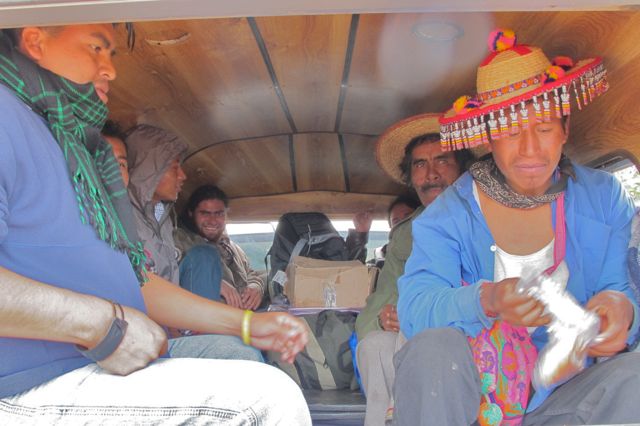We arrived in the fog-draped settlement of Buenos Aires, Durango, just after 9 a.m. It had been a hard night’s drive through a pouring rain, enlivened only by the stories of my tireless travel companion, human rights lawyer Carlos Chávez of the Jalisco Association in Support of Indigenous People (AJAGI, by its Spanish acronym).
We still had nearly three hours to go before we reached Bancos, but meanwhile, a group of comuneros from Buenos Aires awaited a ride in the back of his pickup truck. Chávez jumped out from behind the wheel he’d manned since 10 p.m. the night before, greeting a shivering cluster of men with good cheer and a round of hearty handshakes. A breakfast invitation followed, and Nora, Cristian and Yaser, three other AJAGI members, joined us as we were led through what looked like a refugee camp. Nora and Cristian had passed the night in the back of the truck; Yaser was less fortunate, having passed the stormy night in Buenos Aires.
A bitter windstorm had ripped through the village, stripping the tin roofs from many of the mud-brick homes in the middle of the night as the residents slept. The unrelenting rains and near-freezing temperatures compounded the misery as residents tried to piece their lives back together.
Nonetheless, a visit from Carlos Chávez and the folks from AJAGI was more than reason enough for a gathering. One family with a sheltered outdoor kitchen still in good working order invited us to huddle together underneath as the rains began again, and steaming freshly ground tortillas came off the grill one by one to envelop home-grown scrambled eggs and savory pork-seasoned beans and potatoes. Family members clustered around to beam at us and urge us to eat more as we wolfed down what was likely their sole daily portion. But to decline would have been an insult, so we obliged.
The strange winds, the unseasonable rains, and the unthinkable snowstorm of two weeks prior were recurring themes in our visit. The summer rains didn’t come in time to water the harvest, and much of the corn crop dried on the stalk. Of what survived, much succumbed to fungus when the rains arrived late. And then, month upon month of winter rains – and now the tornado-like windstorm that has just descended upon them, the likes of which they’ve never seen.
Climate change is not a theory for the Wixaritari, the tribal people named Huichol by the Spaniards for easier pronunciation. They are convinced that they are living it every day, and they are seeing it in shorter growing seasons and strange weather patterns. They don’t know the reasons, but it worries them.
There’s no time to dwell on it, however. There’s firewood to be gathered, roofs to fix, children to feed – and, for some, a regional assembly to attend down in the valley in Bancos.

Spirits were high as we clambered into the back of Chávez’ well-worn and mud-caked Toyota pickup truck. Bancos is in a sheltered valley, and considerably warmer than Buenos Aires, up in the mountaintops some 7,000 feet above sea level. Also, most of these families originally lived in Bancos. The residents of Buenos Aires are modern-day pioneers engaged in the act of resettling and at the same time reforesting the land ravaged by timber poachers from the neighboring mestizo communities.
The resettlement is all a part of a larger strategy, devised by Huichol community leaders hand-in-hand with Carlos and the rest of the AJAGI team, which has provided legal and technical assistance for nearly two decades, helping the community reclaim 55,000 hectares of land that had been annexed away from their territory and encroached upon over the years. An estimated 140,000 acres are at stake, including a 10,720-acre swath separating Bancos from its core community of San Andres Cohamiata in the neighboring state of Jalisco. In a groundbreaking decision in 1998, the International Labor Organization ruled that the Huichol people had a right to the land based on ancestral ownership, even though they don’t hold legal titles – a ruling the Mexican government has thus far failed to acknowledge. Repeated pronouncements from the international agency received no response until last year, when the Mexican government finally ruled in Bancos’ favor – but with a catch. It failed to recognize the ancestral rights outlined in a key document called Convention 169, and so the case remains in litigation.
“The case of Bancos at one point was once described by the current director of the United Nations Forum on Indigenous Peoples as probably the most important case in the world” with respect to indigenous land rights, said Chávez. “If the case is resolved in the community’s favor, it will be of benefit to all indigenous people in the world.”
But this is only one of many strategies, one layer of the many layers of stories to be told about the Wixaritari people. I was fortunate to hear many of them in the past week, and I will be sharing them as time permits. Meanwhile, here are some images from the enormously resilient little community of Bancos.
Created with Admarket’s flickrSLiDR.

Leave a Reply